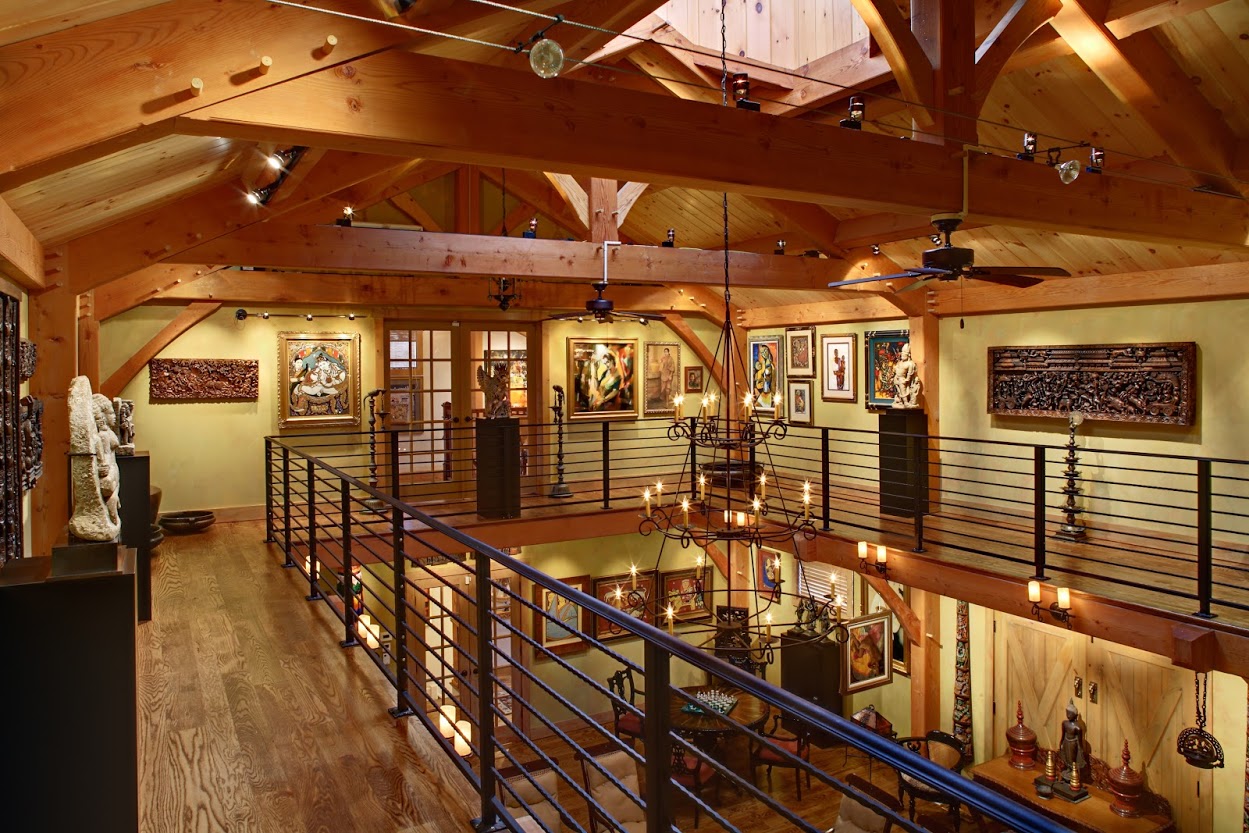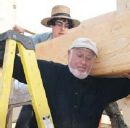“We have failed to protect our children and their children’s children. As of this moment we cannot provide a guarantee that they will grow up on a healthy planet. If there is anything which will ever be too big to fail…this is it. Car makers, insurance companies and banks pale by comparison.” ~Jack Costantino, Pres., TFU~
As a budding senior citizen (67) with 50 years in the knuckle gnarling world of carpentry who can still climb a ladder with one hand on the side rail while carrying a wooden beam on my shoulder, you may think that memories of elementary school are so deeply embedded in a hidden recess of my dwindling mind that little could bring those images to the surface. Not so.
My kindergarten teacher’s name was Mrs. Block…no I’m not kidding. At 5 years old in 1946 I thought her name had something to do with the assortment of toys in the classroom. My favorite was building blocks…go figure. For me stacking one on top of the other in different shapes and numbers was great fun. I liked building pyramid shapes; lots of blocks on the bottom with diminishing rows to a single block at the top. I remember the sense of accomplishment and pride and feeling as if I had done something important. Mrs. Block was quick to reinforce that and cheer us on with over-generous congratulations and her wide maternal smile. I miss Mrs. Block. She’s gone now…but not really.
In 1946, 5 year olds in kindergarten didn’t realize they were learning concepts of math, geometry, trigonometry and architecture, and no one bothered to tell us. Naming the activity and describing its academic nuances may have been confusing anyway. We were just being tricked into having fun. Later, as a slide rule toting high school student in a technical studies program, I didn’t think consciously about those blocks…but they were there.
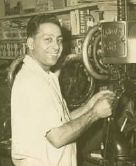 My Father, a native of Italy where he made shoes from scratch moved to Brooklyn, NY and worked in his Father’s Williamsburg shop where they repaired shoes made by machines. I remember watching him from a small booth with a swinging gate, leather upholstered seat, magazine rack and ash tray. Although the entire structure was less than 30″ off the floor, it provided an implication of privacy for bare footed ladies in silk stockings awaiting a new lift for the spiked heels of the 1950’s which caused scarcely exposed calves to bulge in a way men found appealing…perhaps because they were scarcely exposed?
My Father, a native of Italy where he made shoes from scratch moved to Brooklyn, NY and worked in his Father’s Williamsburg shop where they repaired shoes made by machines. I remember watching him from a small booth with a swinging gate, leather upholstered seat, magazine rack and ash tray. Although the entire structure was less than 30″ off the floor, it provided an implication of privacy for bare footed ladies in silk stockings awaiting a new lift for the spiked heels of the 1950’s which caused scarcely exposed calves to bulge in a way men found appealing…perhaps because they were scarcely exposed?
I read Green Lantern and Superman comic books and listened to my Father sing Perry Como and Frank Sinatra songs (better than the originals) and greet customers, his heart in his smile as he drove small wooden plugs into predrilled holes on Cats Paw Brand rubber heals. When I asked why the plugs, he explained they would help hold the nails. It was an extra step, but it was a better job. He loved his work…and his neighborhood, and customers and their broken shoes. I miss my Dad. He’s gone now…but not really.
OK Jack…why are you dragging the readers down this memory trail? This is why…
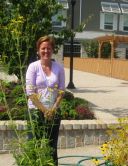 Their names are Stacie Ferrara and Joseph Woerner. I connected recently with these two outstanding individuals during a conference call while exploring examples of eco-literacy in NJ school districts. Both work with the Neptune Township School District which includes Summerfield Elementary School, the first LEED GOLD public school in New Jersey and the Midtown Community School, currently accumulating points toward becoming the first and only LEED PLATINUM public school in the United States. Holy Cow…right here in little old New Joisy…ain’t we somethin’?
Their names are Stacie Ferrara and Joseph Woerner. I connected recently with these two outstanding individuals during a conference call while exploring examples of eco-literacy in NJ school districts. Both work with the Neptune Township School District which includes Summerfield Elementary School, the first LEED GOLD public school in New Jersey and the Midtown Community School, currently accumulating points toward becoming the first and only LEED PLATINUM public school in the United States. Holy Cow…right here in little old New Joisy…ain’t we somethin’?
Stacie Ferrara is Department Chair of Art, Science & Technology grades 6-12, and Joe Woerner is Elementary Science Teacher, Green Curriculum Coordinator. Their official titles tell you what they are…but it doesn’t tell you who they are. I’ll do my best, but I’m not sure I have all the necessary words. As someone married to a career educator with more than 35 years experience in communicative disorders, I get to read the year end notes from parents and their children of all ages. Invariably their sincere expressions of appreciation, especially when written in crayon…make me cry. I believe even more than baseball and football players, educators are the real hero’s of the real world. Crazy idea…but that’s just me. Stacie and Joe are those kinds of educators. Their focus and strategies for teaching about conservation, clean energy and the environment are directed toward including and blending this information in established core curriculum for science, math, social studies and all other basic studies.
They speak of the strategies for teaching their young students using terminology one would assume for kids in college not K-12. But they believe any age is up to the task if the information is presented with intelligence, relevance to their daily and future life and fun. Sort of like building blocks …but better. They speak of developing generations of critical thinkers. Students of all age groups encouraged to learn not just by listening but by asking. Lessons absorbed not by rote but by doing. A learning unit on our water supply includes field trips to the Shark River Estuary where samples are taken and analyzed; flora and fauna are observed and all data is woven into a fabric creating the whole cloth of the eco-system. Hands and minds muddied and than clarified with real knowledge gained from full and personal immersion.
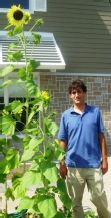 Among the assets at Summerfield are the specially designed school house, the 36 acre Summerwood Wetland project and then of course…there are the Sunflowers and Tomatoes. In addition to other innovations Joe Woerner created and manages the garden project. Students build the garden, plant the crops, cultivate their growth and then distribute, share and consume the food. The project reaches into the broader community at harvest time with programs where students present their produce and answer questions about the growing process which does NOT include pesticides and artificial fertilizers. When 10 year olds talk…adults listen. Stacie and Joe describe their use of the LEED GOLD Summerfield School House, its special attributes and their creative hands-on approach to learning as a living text book. I believe they’re right.
Among the assets at Summerfield are the specially designed school house, the 36 acre Summerwood Wetland project and then of course…there are the Sunflowers and Tomatoes. In addition to other innovations Joe Woerner created and manages the garden project. Students build the garden, plant the crops, cultivate their growth and then distribute, share and consume the food. The project reaches into the broader community at harvest time with programs where students present their produce and answer questions about the growing process which does NOT include pesticides and artificial fertilizers. When 10 year olds talk…adults listen. Stacie and Joe describe their use of the LEED GOLD Summerfield School House, its special attributes and their creative hands-on approach to learning as a living text book. I believe they’re right.
Stacie and Joe comment…
Math:
With all the activities planned with the Green Curriculum – there will be an emphasis on increasing inquiry – allowing students to come up with questions, designing the experiment to develop critical thinking and problem solving skills and creating a student product (Power Point, journal, proposal, a new initiative, pod cast, video, debate, etc). Students will need to develop good measuring skills, collecting and organizing data so it can be analyzed. The focus of the green investigations is to put the students into a real world problem (focusing on the Neptune community) and applying the math skills (measurement such as area, volume, concentrations, calculating, predictions, cost analysis, budget proposals, etc). They will learn the “So what?” and “When will I use this math?” by connecting the placed based problems and the math, which is what the Green Curriculum Committee is developing.
Here is a sample placed problem for a student (not yet written in curriculum). The customers of the local Neptune dry cleaner have been complaining about the odor left on their clothes. The owner would like to use more environmental friendly materials, but is concerned about the cost of the materials. Develop a cost analysis for the owner of the dry cleaners for switching to more “green” chemicals and include in the proposal other environmental friendly practices he can incorporate into his business.
Science:
I could write forever on this section- so I will keep it simple. With the recent purchase of Vernier probes (data collection) – lab investigations will include short term and long term data collection.
All current lab investigations will be revised to be more inquiry based (student asking the questions and designing the experiment). They will also be rewritten to be more “green” in terms : preventing and minimizing waste; designing less hazardous chemical synthesis; using safer chemicals; increasing energy efficiency (limiting heating reactions); using renewable feedstock’s; bio-diesel (use waste material); and minimize potential accidents; so students and teachers will have less impact on the environment.
One of the labs the Green Curriculum Committee will be incorporating into the chemistry curriculum will be making bio-diesel. Students will do small scale investigations and then connect with a local business to produce larger samples of bio-diesel. Student will analyze samples and continue to develop the procedures and formulation so end product can be used b by school or community diesel motors.
Social Studies:
As the science “green” curriculum is written – all of the units/investigations will be connected to all of the other content areas – math, language arts, social studies, arts and technology. This is especially true at the elementary level, where the teachers teach all subjects (unfortunately – least excited about science – we are working on changing their attitude about it). We hope they will find the curriculum and activities relevant to themselves, their children, their students and the community they work and live in. As the teachers learn about it, the students and teachers will develop their eco- awareness together. Look out Class of 2022!
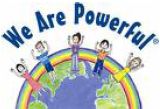 Teaching by experience, input and results and encouraging inquiry and examination puts our kids at the top of the food chain in a process of empowering them by becoming the owners of the information. Once experienced it no longer belongs to a teacher, textbook or school building. It belongs to them…because it becomes them.
Teaching by experience, input and results and encouraging inquiry and examination puts our kids at the top of the food chain in a process of empowering them by becoming the owners of the information. Once experienced it no longer belongs to a teacher, textbook or school building. It belongs to them…because it becomes them.
If you believe as I do that the need for this kind of approach to general education and in particular as it applies to our environment, conservation and development of clean energy alternatives, you may also be surprised to know that it is uncommon in the NJ and National school system. Although the prerogative is available a school district and school in terms of facilitating core curriculum, most schools use more traditional methods of classroom instruction. How will we expand the Neptune Affect and carry its philosophy and momentum across the state and nation? I believe the model is irresistible, essential and overdue.
We have failed to protect our children and their children’s children. As of this moment we can not provide a guarantee that they will grow up on a healthy planet. If there is any thing which will ever be too big to fail…this is it. Car makers, insurance companies and banks pale by comparison.
Should we accept and encourage this imperative to allow our children to not only learn…but own the information they will need to rescue themselves from our failure, we may have one more shot to redeem ourselves. Someday…we will be gone…but not really.
Please feel welcome to comment and contribute at: timbersRus@comcast.net.
Jack Costantino
USGBC-NJ Newsletter Committee
201.230.6429
